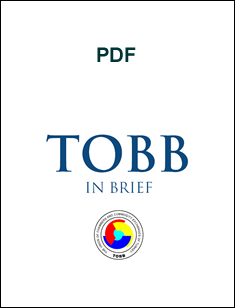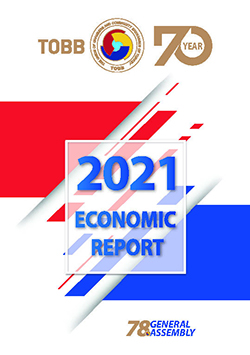Yorgancılar attended the Western Balkans Regional Chamber Conference

16.06.2015 / Vienna
TOBB Board Vice Chair Ender Yorgancılar represented TOBB Western Balkans Regional Chamber Conference in Vienna hosted by the Austrian Chamber of Economy prior to the Western Balkans Conference which will be held in Vienna in August.
High level representatives or Serbian Chamber of Commerce, the Kosovo Chamber of Commerce, Tirana Chamber of Commerce (Albania), Bosnia and Herzegovina Chamber of Commerce Economic Chamber of Macedonia and Montenegro Economic Chamber of the meeting attended by the President, Slovenian Chamber of Commerce, the Croatian Chamber of Economy of Germany Trade and Industry Chamber were also present
Opening speech of the conference was given by Austrian Chamber of Economy (WKÖ) Vice Chair Martha Schultz, followed by speeches from Serbian Chamber of Commerce Chair Marko Cadez, Kosovo Chamber of Commerce Chair Safet Gërxhaliu, EUROCHAMBRES International Relations Director Dirk Vantyghem and TOBB Board Vice Chair Ender Yorgancılar.
During his speech Yorgancılar said:
We are the business. We are the prime movers for a better and stable region. We are the main actors for concrete economic and social development initiatives. Here I also would like to congratulate the WKÖ for hosting such an important and inspiring event. It is encouraging for a better and safer Europe to witness that besides the countries from the Balkan regions, EUROCHAMBRES and major EU member countries are also here.
Benefiting from this occasion let me also share my appreciation for the technical dialogue between Serbia and Kosovo Chambers. This initiative is also facilitated by EUROCHAMBRES.
Let me mention one more encouraging confidence building initiative, in which TOBB, Union of Hellenic Chambers, Cyprus Chamber of Commerce and Industry and Turkish Cypriot Chamber of Commerce have been involved. These four chambers have established the Nicosia Economic Forum and are working on concrete projects in order to create a better future for all Cypriots.
Having said these let me share some of our findings on the common economic challenges of the Western Balkan Countries. The level of regional economic integration between Western Balkan Countries is very low. The physical infrastructure of connectivity requires a lot of investment. Connectivity is a must for a more integrated region.
The EU is the main trading partner of Western Balkan Countries. This is good for the future economic transformation. However, with the exception of Serbia, these countries export mostly lower value added products. Historically, the Western Balkan Countries have been unable to increase technological sophistication of their production capabilities. This is another area we should concentrate. One potential source of increasing capabilities, and therefore competitiveness, are FDI inflows to higher technology industries. For instance, Fiat’s investment to Serbia is a good example of such development.
However, FDI coming to the Western Balkan Countries is lower than what is needed. The Western Balkan Countries receive about 30 percent less FDI per capita compared to its EU member neighbours. A significant majority of the FDI is into low value added sectors. More than half of the total FDI inflows in the past decade are in either energy or real estate. Western Balkan Countries has also demographic problem. The countries experience negative population trends and significant levels of brain drain. We must develop approaches and policies to keep the young and bright minds in the Balkans. This is very important for the region’s economic transformation process.
Having mentioned these challenges, as businessman, I also would like to underline the huge potential of the Western Balkan Countries. Turkey and Turkish companies are already active in Balkan countries. The investments from Turkey to the Balkan countries have been increasing. We consider this region as a gateway to the EU; a future hub for investment; A hub for Turkish and also for the EU companies.
Therefore the improvement of the investment ecosystem is significant. The EU membership process, the privatisations, development towards a fully functioning market economy, skill and human recourse development will help to speed up the process of becoming a centre of attraction for further investments.
We know that Balkan countries in the future will become much more integrated to the EU and world economy and finally become more prosperous. For this reason, the EU membership process is an instrumental anchor; and this anchor has to be kept fresh and achievable.
Deepening and expanding the relations with Balkan region is utmost important for Turkish business community. The integration of Balkan economies with Turkey and naturally with the EU is mutually beneficial for Balkan countries, EU and Turkey. Reaching out Middle East, Caucuses, Central Asia and North Africa via Turkey will also help Balkan Countries to generate economic growth and employment.
We are working on a study, where we shall analyse the cooperation opportunities and discover the potential spill over effects of increasing economic interaction between Turkey and the Western Balkans. This study is conducted by the Regional Cooperation Council and Economic Policy Research Foundation (TEPAV), a think –tank, which was established by TOBB. The aim of the study is threefold: Firstly, to underline the economic transformation potential of the Balkan countries and highlight the current economic relations with Turkey. Secondly, to develop ideas of further opportunities for the business community and help for concrete business opportunities. We know very well that there are plenty of opportunities in manufacturing, tourism and ICT sectors. This study has been focusing on the details with a business perspective. Thirdly, through this study we would like to present to the decision makers a road map, and recommendations on concrete policy options and project proposals. These recommendations will cover public and private institutions and naturally the chamber network.
The team of TEPAV, our think-tank, has already visited Albania, Bosnia and Herzegovina, Serbia and they will visit Montenegro, Former Republic of Macedonia and Kosovo. During the study visits the team met decision makers from public and private sector and collected the necessary economic data for the report.
We are planning to finalise our report soon and launch it on September 3-4 in Ankara during the B20 events. We should like to share the business opportunities in the Balkan region with Turkish as well as all business leaders from all over the world. So, we would like to welcome you all to this very important meeting.
Here I would like to conclude my remarks and wish success for the work toward the Vienne Summit of August this year. Once again, I thank you all for your commitment and hardworking for a better future of all Europe.”
Your message has been sent
Thank you |




